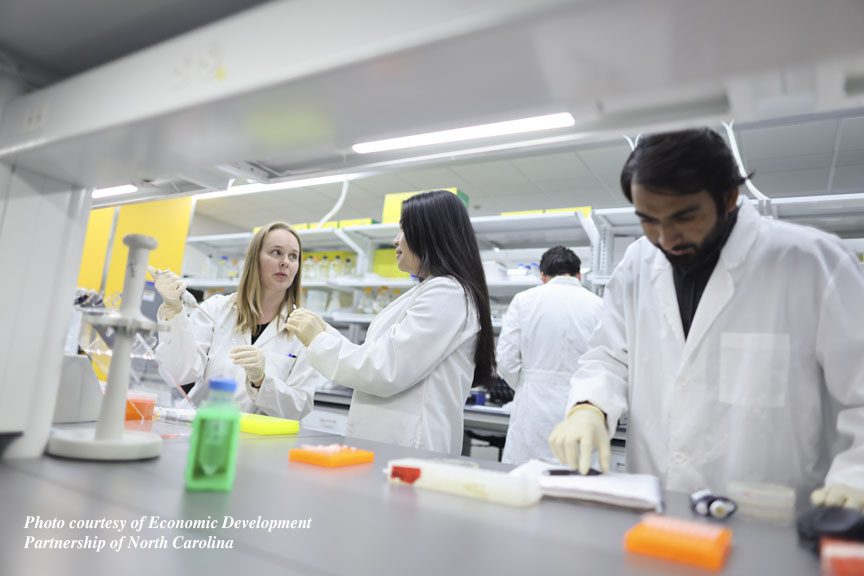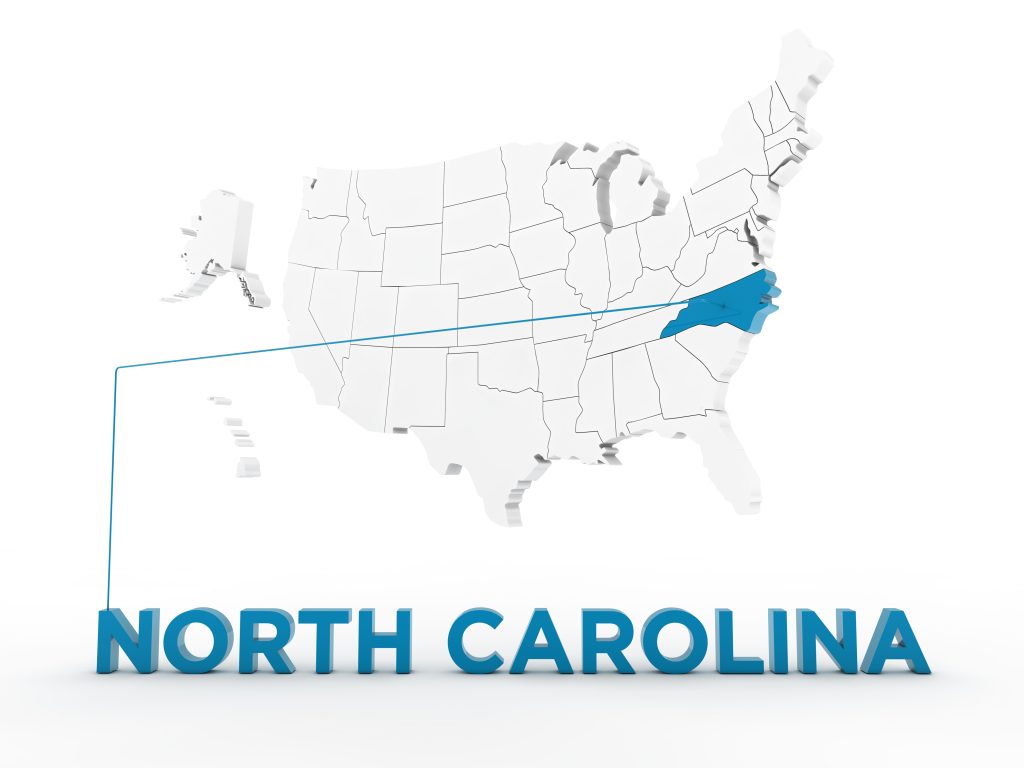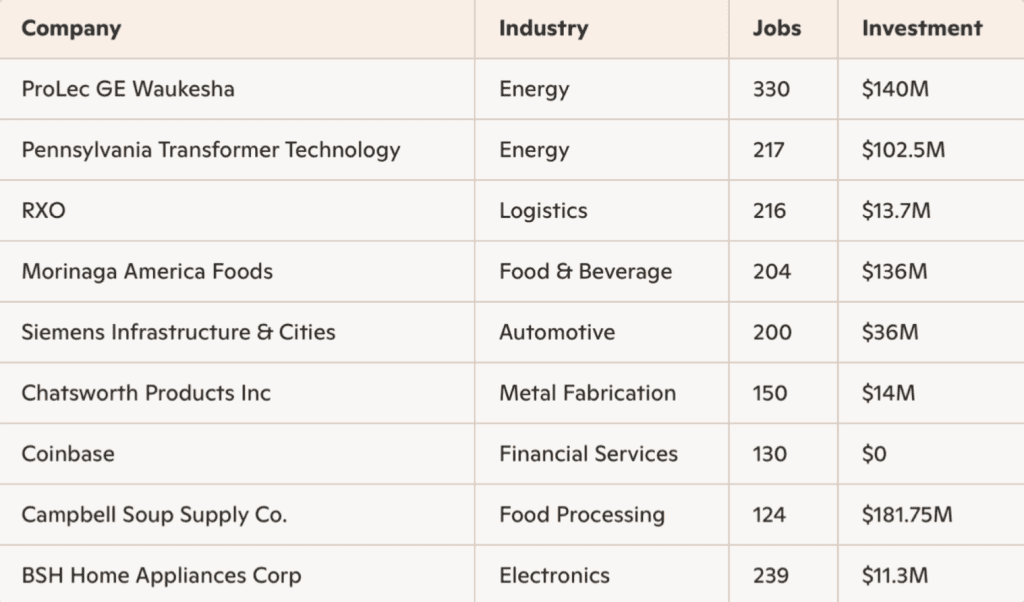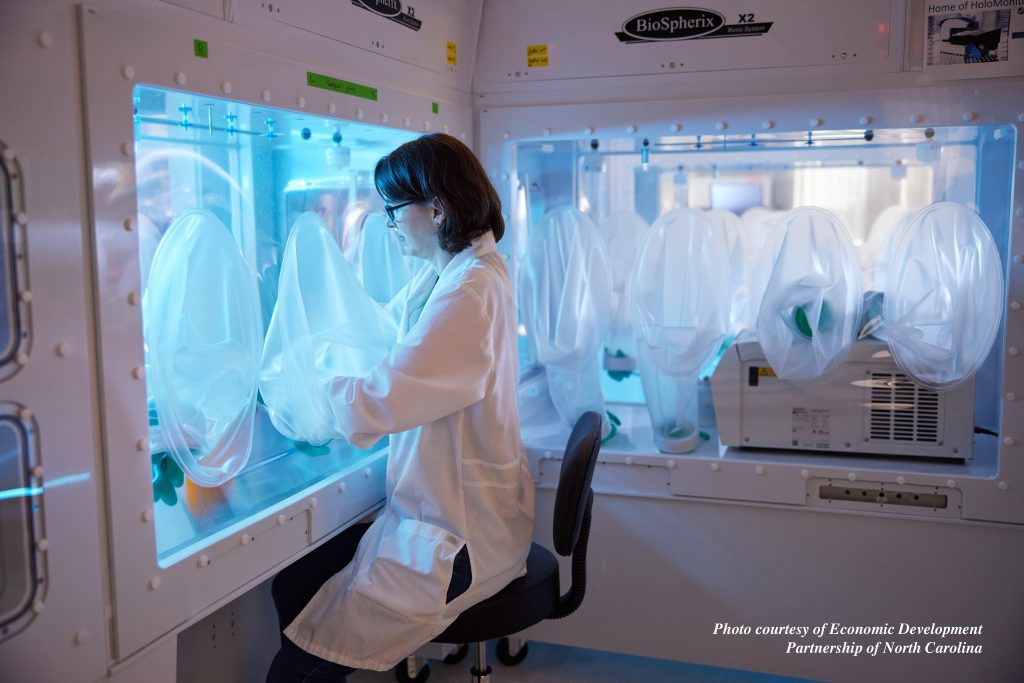When most people think of aerospace or life sciences, North Carolina might not be the first state that comes to mind. But that perception is changing rapidly. North Carolina is quietly becoming a national leader in both aerospace/defense and life sciences, with statewide assets, shovel-ready sites, and a collaborative ecosystem that’s fueling innovation and growth.
Aerospace & Defense: A Legacy of Flight, A Future of Innovation
North Carolina’s aerospace and defense sector is rooted in history—Kitty Hawk was the launchpad for powered flight—but today, it’s defined by cutting-edge manufacturing, research, and logistics. From the mountains to the coast, the state offers a diversified network of suppliers, manufacturers, and MRO (maintenance, repair, and overhaul) facilities.
Statewide Strengths:
- JetZero, Inc., a breakthrough aviation company, will invest more than $4.7 billion in Greensboro to build its first commercial airplane manufacturing facility at the Piedmont Triad International
- Airport creating more than 14,560 jobs by 2063, the largest economic development project in North Carolina history based on job commitment.
- Pratt & Whitney recently announced a $285 million expansion to their existing manufacturing facility that opened in 2020 in Asheville, creating 325 additional jobs in aircraft engine manufacturing.
- Duotech Services is investing $6.5 million in Franklin to expand defense electronics maintenance, adding 95 jobs.
- American Titanium Metal will invest nearly $900 million in Fayetteville to produce aerospace-grade titanium, creating over 300 jobs.



These investments are supported by North Carolina’s infrastructure: 300+ aerospace manufacturers, access to major ports and rail systems, and a workforce enriched by military veterans and engineering graduates. The state’s aviation gasoline and jet fuel exemptions, low industrial electricity rates, and streamlined permitting make it a cost-effective launchpad for aerospace growth.
Life Sciences: A Statewide Surge in Biotech and Biomanufacturing
North Carolina’s life sciences sector is booming—and it’s not just confined to the Research Triangle. With over 840 life sciences companies employing more than 75,000 people statewide, the industry is expanding into communities like Concord, Wilson, and Greenville.

The life sciences sector has steadily grown in the Triangle and Wake County for decades, but momentum has picked up in recent years, especially in biomanufacturing. Key elements driving this growth include the area’s top-tier education system, established workforce development programs, a low corporate tax rate, lower overall costs, available sites and space, and a developing transportation system for shipping and supply chains. These factors are transforming the area into one of the country’s emerging biotech hubs.
Major Announcements:
- Novo Nordisk Pharmaceutical Industries Inc. is investing a staggering $41 billion and creating 1,000 jobs in pharmaceutical manufacturing in Johnston County.
- Coriolis Pharma, a German biotech firm, is launching a $10 million lab in Morrisville, adding 50 high-paying jobs and anchoring its North American expansion.
- Eli Lilly, Thermo Fisher, and Fujifilm Biotechnologies have all expanded operations in the state, citing its talent pipeline and manufacturing infrastructure.
- Genentech, one of the world’s premiere biotechnology companies, will invest $700 million to build a new manufacturing plant in Raleigh, creating 400 jobs.
North Carolina’s success in life sciences is powered by its educational institutions and workforce development programs. The North Carolina Biotechnology Center, along with community colleges and universities, offers training programs that connect students, veterans, and transitioning service members to careers in biomanufacturing. And North Carolina Community Colleges have developed the BioWork program designed in partnership with major biotech companies to train workers in pharmaceutical manufacturing to the specific certifications and skill requirements needed to step into high-paying jobs.
Shovel-Ready Sites & Incentives: Building the Future, Fast
One of North Carolina’s most compelling advantages is its inventory of shovel-ready sites, megasites, and certified SelectSites. These properties have undergone rigorous prequalification to ensure they’re ready for immediate development.
Key Programs:
- Certified Sites Program: Offers 31-point vetted industrial sites with utilities, environmental audits, and development plans.
- SelectSites Initiative: Identifies properties with strategic access to transportation and utilities, ideal for aerospace and life sciences companies.
- Building Reuse & Demolition Grants: Help local governments renovate or clear sites for new business development, especially in rural areas.
These programs are complemented by performance-based incentives, including discretionary grants, tax exemptions, and customized workforce training. The One North Carolina Fund, for example, helped Michelin North America Inc. expand in Stanly County with a $620,000 grant, creating 74 jobs and investing $11.3 million in Norwood.
Norwood is welcoming Michelin North America Inc., whose expansion will bring high-quality employment and infrastructure investment to the area. These announcements reflect the broader trend: companies are choosing North Carolina not just for its urban centers, but for its rural communities, too.
CNBC’s Top State for Business: A Title Earned
North Carolina’s recognition as CNBC’s America’s Top State for Business in 2025 is no accident. This is the third time in the last four years that North Carolina has topped the list. This year the state scored especially well in economy (ranked 3rd), workforce (4th), and business friendliness (4th), with strong showings in education and access to capital. Its corporate tax rate of 2.5% (declining to 0% by 2030) and individual income tax rate of 4.25% (declining to 3.99% in 2026) make it one of the most financially attractive states for business.

Governor Josh Stein emphasized the state’s collaborative approach: “Our people, state’s business climate, top research universities and excellent community college system, infrastructure, and high quality of life help both companies and workers thrive”.
A Wave of Investment: Diverse Industries, Unified Growth
Beyond aerospace and life sciences, North Carolina is attracting investment across sectors:

These projects span manufacturing, logistics, energy, and finance—demonstrating North Carolina’s versatility and appeal to a wide range of industries.
Quality of Life: Where Business Meets Balance
North Carolina’s appeal isn’t just economic—it’s personal. With scenic mountains, 300 miles of coastline, vibrant cities, and charming towns, the state offers a lifestyle that attracts and retains talent. Lower cost of living, cultural amenities, and outdoor recreation make it a place where employees want to live, and companies want to grow.
Conclusion: The Secret’s Out
North Carolina is no longer a hidden gem—it’s a rising star. With statewide assets in aerospace/defense and life sciences, shovel-ready sites, strategic incentives, and a top-tier business climate, the state is redefining what it means to be a powerhouse. Whether you’re launching satellites or synthesizing cell therapies, North Carolina offers the infrastructure, talent, and vision to help your company soar.






